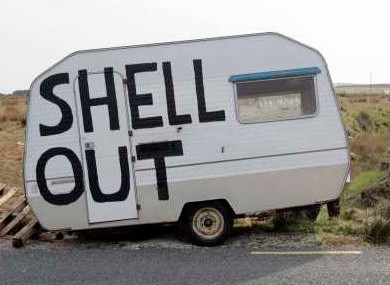 26 July 2013 Gerry Bourke – a farmer from Aughoose in County Mayo – is insisting he has no case to answer after being hit with a criminal damage and trespass charge in relation an incident at Shell Ireland’s tunnelling site in the village.
26 July 2013 Gerry Bourke – a farmer from Aughoose in County Mayo – is insisting he has no case to answer after being hit with a criminal damage and trespass charge in relation an incident at Shell Ireland’s tunnelling site in the village.
Gardaí confirmed to TheJournal.ie that a man was questioned in relation to an incident at the site in Aughoose on 22 June last by officers at Belmullet Station. The 48-year-old was arrested and questioned for around six hours yesterday, before being released.
Bourke – who is a supporter of the ‘Shell to Sea’ campaign – says he was engaging in a peaceful protest with several others on the date in question, and that he “couldn’t guess” as to why he was being charged with criminal damage. He told TheJournal.ie:
I was protesting at the site… I will keep protesting what’s going on as long as there’s life in my body.
He said the Shell to Sea campaign would continue in order to draw attention to the “unfairness” of what was happening in Mayo, adding:
Ownership of oil and gas should belong to the people. You cannot have a situation whereby people don’t own natural resources. There has to be a fair deal done for the country.
Gerry Bourke is due to appear in court in Belmullet on 11 September.
A spokesperson for Shell said that some damage had been caused at the site on the date in question, but declined to comment further as the case is now before the courts.
The Corrib Gas Project – which involves the extraction of natural gas from the northwest coast of the country – has been the subject of long-running opposition from ‘Shell to Sea’. Most recently, the group erected a series of signs close to a location where drilling was taking place, warning locals of the danger posed by ‘sink holes’.

 26 July 2013 Gerry Bourke – a farmer from Aughoose in County Mayo – is insisting he has no case to answer after being hit with a criminal damage and trespass charge in
26 July 2013 Gerry Bourke – a farmer from Aughoose in County Mayo – is insisting he has no case to answer after being hit with a criminal damage and trespass charge in